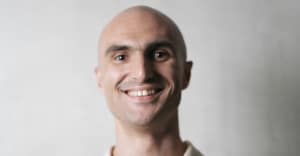Majical Cloudz Just Wants To Have A Little More Fun
Are You Alone? is a little sunny, but still intensely emotional.
With a red button-down tucked into black skinny pants, Majical Cloudz’s Devon Welsh looked like an alien flamenco dancer as he walked into National Stardust, a new Williamsburg venue that also happened to be the U.S. launching spot for Cloudz’s new record, Are You Alone?
A collaborative endeavor between Welsh and Matthew Otto—the mastermind behind their minimalistic sound—Majical Cloudz first made waves with Impersonator, their 2013 record that featured dark, soothing melodies, droning synths, and heart wrenching lyrics. Their work is highly emotional and that was apparent last week in Brooklyn. Welsh stood in front of a crowd, his head freshly shaved, and he’d lock eyes with anyone brave enough as he bellowed lyrics like, “Hey man, sooner or later you’ll be dead.”
Are You Alone? feels like a natural progression. It’s still melancholic, melodramatic, a little nihilistic, but there’s also an optimism in it that distinguishes it from its predecessor. It’s slightly more upbeat, uptempo, and even when despondent, Otto and Welsh preach love. “And if suddenly I die / I hope they will say / That he was obsessed and it was okay” Welsh self-eulogizes in their single “Downtown.”
The afternoon before their first New York show in over a year, The FADER sat down with Welsh to discuss Are You Alone?, their stage presence, touring with Lorde, and why Cloudz’s music isn’t a collection of “sad songs.”
How was recording this album different to your previous efforts?
The whole project, as it currently is, began with me having a few songs that I thought were all part of the same thing. Me and Matt started working together and it was a piecemeal. We started playing shows and it took us a while to start recording. Then it took a long time for us to get the first couple of songs right. We were just figuring out how we were going to record. After that, it all came into place. It was weird working on it, whenever we could really. It was only when the record was finished that we really did any shows outside of Montreal.
Making the record this time around also took a long time, in a sense. I started writing songs for it even before Impersonator came out. I kept writing. In January 2014, we started to record but it was all experimenting and taking our time. We took a break from that for a while, went on tour again. I wrote more songs. Then we kept going, changed around a bunch of the stuff we had done before, and then put it out. I guess it was different in the sense that we were juggling touring while we were doing the record. There was also a sense that we were doing it for a reason. When we were making our first record we were making it purely out of fantasy, wondering if we could have an audience. When we were making the second one we knew that at least some people would care. That sort of changes the process of it.
Was there a certain intent you were writing with this time around? Something you were actively trying to achieve with this record?
I feel like maybe the first half of the time I was writing, a lot of the time in the back of my mind I was writing songs based on what I thought would be a logical extension of what we had done before. Like, ok. That’s what we sounded like then. I need to keep that in mind, but maybe make something that’s a little different. Then at a certain point I decided to forget about that completely. I tried to write whatever I ended up writing. I would choose the things I liked best out of that.
It seems like without sacrificing any of the intensity that made Impersonator so memorable, this record strikes me as a more uptempo, upbeat. Even more optimistic. Was that something you were trying to achieve?
For sure. Especially later on. After we went on tour--the tour with Lorde--we came back and I was writing more. I was thinking more about that. I wanted to make music that had a bit more of optimism to it, that had a happy ending.
Why did you want to go in that direction?
I just felt like if I was going to be a musician and write music that people are going to consume, I wanted to do something that was going to put some net positivity into people’s ears. Rather than be a sulking thing. I wanted to make something that felt like I was at least trying to embody the right feelings.
Do you think these feelings came with touring and playing a much larger audience? Opening for someone like Lorde, did that change the way you thought about writing and performing?
Maybe to a certain extent. It’s hard to say what influences you and what doesn’t. Life is just a mix of all kinds of factors. I think it probably did though. When we were starting to play shows, there could be really heavy songs and I could have a really heavy attitude about it. It would work, it would be natural. When we went on the Lorde tour there were so many people at the shows. You can’t really be, what’s the word? Introverted on stage.
You lose that intimacy you get playing in small venues? It changes the way you interact with audiences.
Exactly. You can still interact with the audience, but it then has to happen in a more extroverted way. You have to be like, “How is everybody doing!”
What acts do you think about a lot when writing?
I really used to really love Elliott Smith and listen to him all the time. I would listen to music like that. It’s about getting the most intense emotions out in the songs. I end up saying the same things over and over again to people. When I was making the album I was listening to the Smiths a lot. Although the Smiths aren’t really like that as much. The Smiths, Smashing Pumpkins. Sometimes I listen to Deftones, especially when we were first starting to work on the album.
Are your other interests equally as intense?
I tend to read history. Basically history, or history of ideas. Those of the kind of things I like, big books about history. Maybe that’s melodramatic. History is sort of melodramatic. Maybe not in the same way. I don’t know. Maybe my tastes reflect the interests I have about art, but can’t sum it all up objectively.
Why has it been important for you to express the lows? Do you think it’s important for the audience to have to listen to it? That sounds shitty, but obviously it’s not as easy as listening to something that’s upbeat or really positive and full of energy.
I guess it’s just natural for me to write about those things. It’s more complicated emotions, things you want to think through to yourself. An exciting story has a conflict of some kind. There has to be something there. I think that reflects itself in the things that people are drawn to writing music about. Why people should listen to it? I don’t think that they should. I can only look to myself as a listener and recall that I have really enjoyed listening to sadder or more introspective music throughout my life. I’ve gotten a lot from it. It can be a comfort to be able to listen to music that just reflects your feelings about a certain thing.
Do you reject the idea of “sad songs” as a label?
Yeah. I said this before, but sad music is pessimistic. I would see sad music as pessimistic. The whole tone is not looking up. I feel like most of our songs, maybe not all of them, there’s a bit of humor to them. They are optimistic.
Especially with this record. It’s seems like so much of what was being said was that it was okay to feeling a certain way. There was humor to that. In “Downtown” it’s the idea of being obsessed and crazy and how that’s fine.
Yeah. It’s not really sad. That song is not sad and a bunch of them aren’t at all. I feel like it’s a confusion of terms. What sad means vs. something else, introspective.
Do you have anxieties about accessibility and inaccessibility?
No. If I like it, if I think that it is something that is hitting the right spots for me, then I feel like it would probably be accessible to some people. I’m not really concerned with scaling the reach out of music. Not really.
Do you feel like your performance style has changed with this record?
When we started playing it was more of a theatrical enterprise for me. I exaggerated certain parts of myself for the sake of performance, as a character. Over time I have gotten away from that by just becoming more comfortable with myself, just more confident in being whoever I am. Maybe it’s changed. It’s hard for me to say. Someone could have seen me two years ago and they see me today and they’re like, “You’ve changed so much. Your voice sounds different.” For me, I’ve been consistently seeing as things have gone on. I can’t draw any clear lines.
In terms of theatricality, you think you are less inclined now to put on a character?
Yeah. I like to be really animated and to engage with the audience and bring a lot of energy to the show. I think over time I’ve become more comfortable with myself. I felt less inclined to mask my deficiencies by exaggerating certain characteristics.
What do you think you were exaggerating?
Way back when we first started playing I was really deadpan the whole time. I would never crack a smile. I wanted it to be super heavy. Even if that wasn’t necessarily how I felt all the time. I thought the show demanded it or required it. This emotional valence, this emotional frequency. Now I feel like how we are feeling we are going to bring that to the table. And how the audience responds to us will just dictate how things go. Whether it is more silly or not silly.

